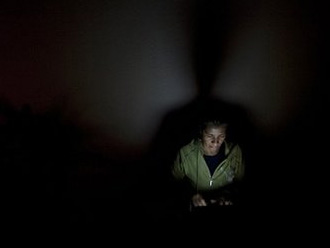
|  |  |  News Around the Republic of Mexico | December 2008 News Around the Republic of Mexico | December 2008  
Mexico's War on Drugs Claims Another 30 Lives
 Ed Vulliamy - The Observer Ed Vulliamy - The Observer
go to original


| | Journalist Julieta Martinez, 45, writes on her computer in Tijuana, Mexico, Tuesday, Nov. 4, 2008. Mexico is the deadliest place in the Americas to be a journalist, and among the deadliest in the world. The New York-based Committee to Protect Journalists says at least 24 journalists have been killed since 2000, and seven have vanished in the past three years. (AP/Guillermo Arias) |  |
Mexico's narco war - which has claimed more than 4,000 lives since a military offensive was launched against the drugs cartels two years ago - spiralled further out of control this weekend, as another 30 people were found dead and one of the country's most senior police chiefs was accused of collaborating with the drug barons.

On Friday, gangland executions were carried out in the Pacific state of Sinaloa, traditional homeland for Mexico's cartels, and 17 people died in the border town of Ciudad Juárez on Thursday, including a senior police investigator.

Yesterday, Mexico's former acting federal police chief, Gerardo Garay, was accused of collaborating with a notorious cartel and stealing money during a raid on a drug trafficking ring. A judge ordered Garay's arrest on suspicion of organised crime, robbery and abuse of power.

Last week was one of the bloodiest since President Felipe Calderón mobilised 40,000 troops against the cartels; the carnage has predominantly occurred in cities along the border with the United States. Ninety per cent of all illegal drugs consumed in the US come from Mexico, with rival cartels fighting for 'plazas', or turf.

The Pacific border town of Tijuana counted its bloodiest 48 hours to date this week, with 36 bodies found over two days. Twelve had been executed together, and were left decapitated and mutilated in a car park.

The sudden escalation led to the dismissal of police chief Alberto Capella Ibarra, who was interviewed by The Observer last month and warned: 'This war will continue so long as drugs are illegal and command high prices in the United States. Legalise the drugs, then the Americans can get high and we can live in peace.' The new police chief is Lieutenant-Colonel Julian Leyzaola, recently brought in to command the city's special forces. Mexico's state and municipal police have been heavily infiltrated by the cartels and the government has promised to bring them under its control.

Calderón's government is the first in Mexico seriously to confront the cartels, and the resultant war is in part a response.

Leyzaola told The Observer that the level of violence was the result of 'social terrorism' by the narcos. 'All I can do is to increase a police profile in the community to avert the kind of social psychosis that the narcos want to generate,' he said. 'I pledge physical presence to reassure people, and intelligence and manpower to fight the criminals themselves.' |

 |
|  |



